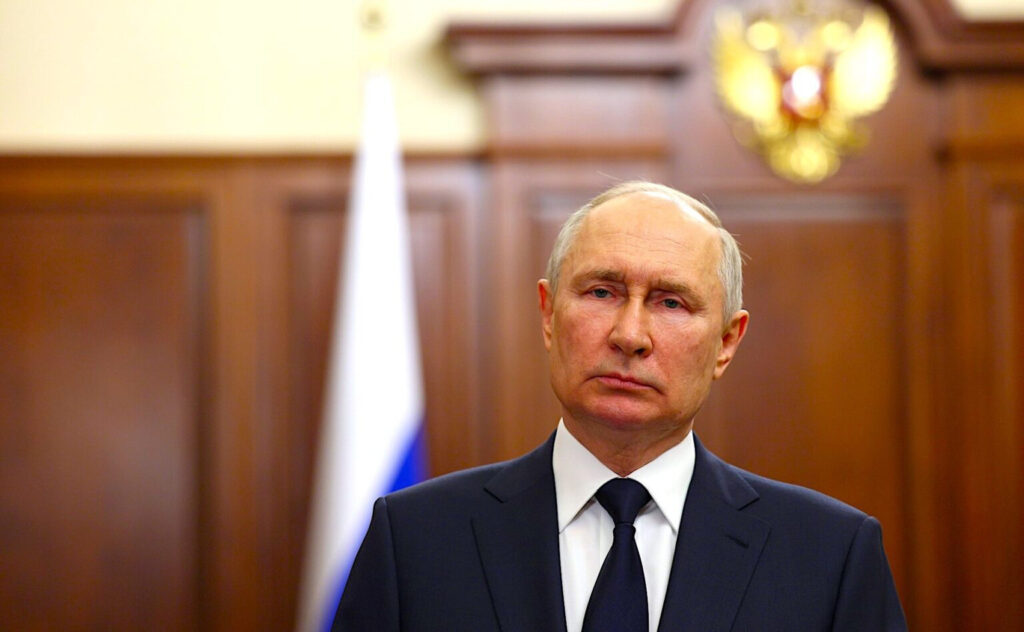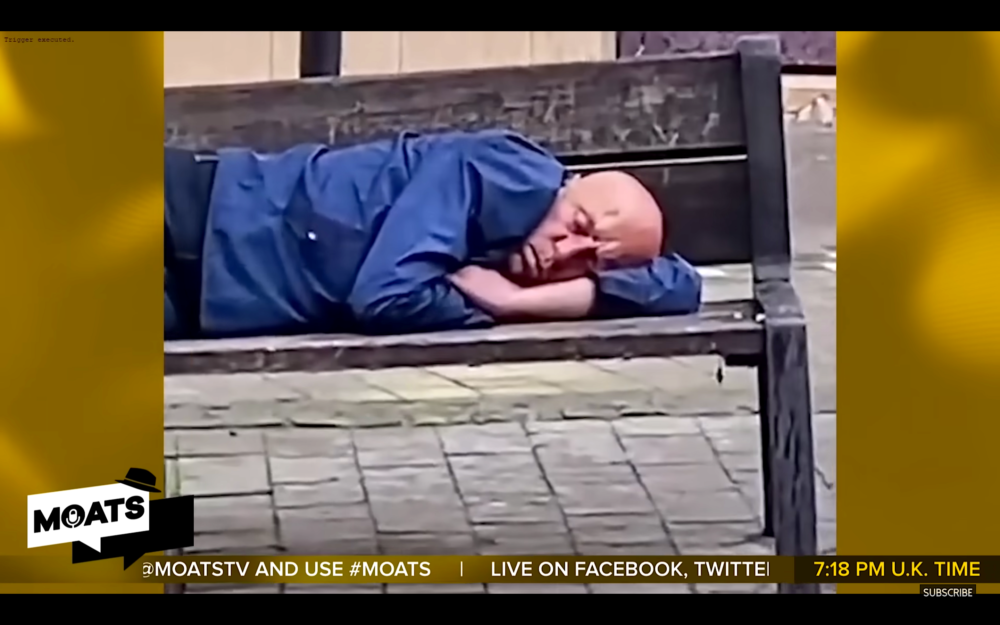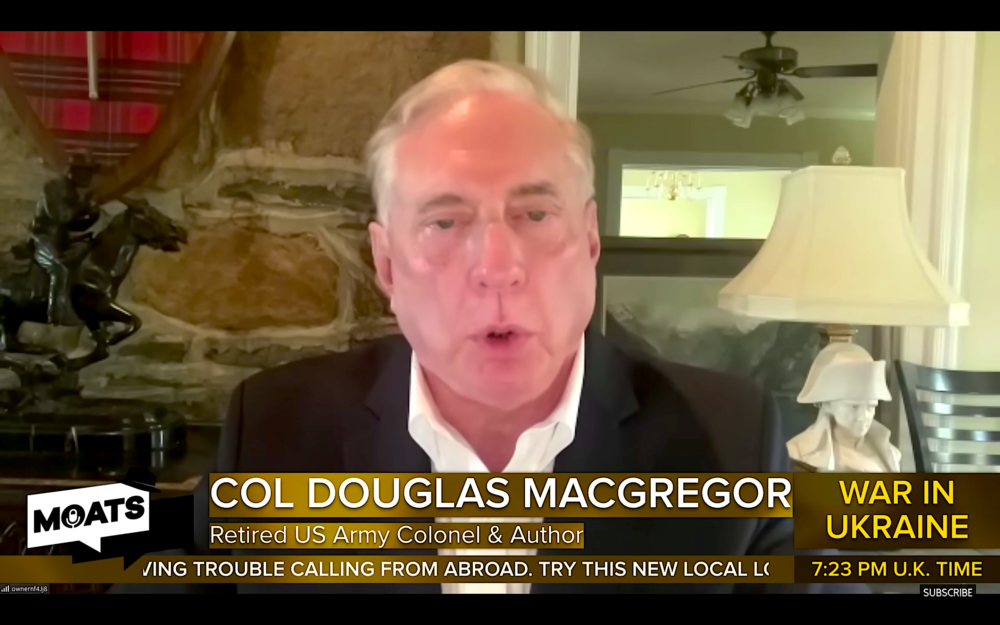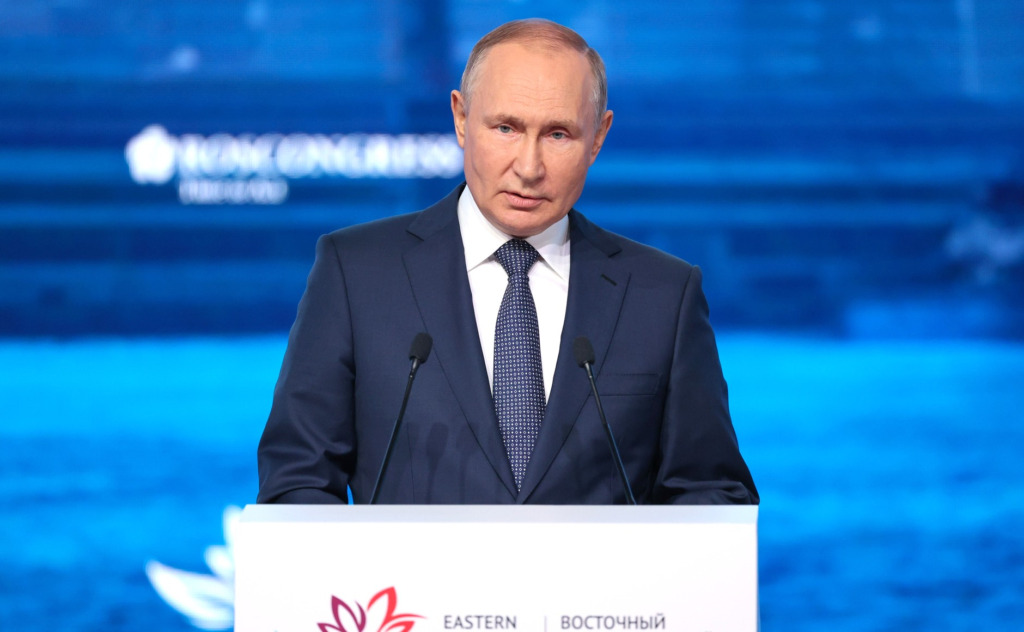
By Joe Lauria, Consortium News, 7/7/23
Two weeks since the bizarre events in Russia on the weekend of June 23-25 there still remain different interpretations of Yevgeny Prigozhin’s 36-hour adventure on the road to Moscow and its aftermath.
Was it a genuine mutiny or coup attempt? Was he working with Western or Ukrainian intelligence? What is Prizgozhin ‘s and the Wagner group’s future? And, most importantly, why did he do it?
The drama ended when Prigozhin called off his march on the capital, turning around his column of 4,000 or so Wagner men. With Russian special forces in Moscow arrayed to meet him at the city gates, and Chechen forces headed to Rostov-on Don, which he partially occupied, reason took hold as Prigozhin realized death awaited him and his men.
The anguish in London and Washington was palpable. They thought they were on the verge of achieving the principle aim of their war against Russia: overthrowing Vladimir Putin. They are still pushing the line that Putin was irrevocably weakened by the event and that Russia is a dangerously unstable country.
The Deal
The president of Belarus, Aleksandr Lukashenko, worked out a deal to end the crisis. In return Russia – for the moment anyway – dropped its criminal charges of mutiny against Prigozhin.
He lost his post and was reportedly exiled to Belarus. But now there are even doubts about that. Lukashenko said on Thursday that Prigozhin is a “free man.” He said, “Maybe he went to Moscow, maybe somewhere else, but he is not on the territory of Belarus.”
The New York Times reported on the same day that Prigozhin may be using a look-alike:
“A Pentagon official who spoke on the condition of anonymity because of the sensitivity of the situation later confirmed that Mr. Prigozhin had been in Russia, between Moscow and St. Petersburg, during most of the period since the mutiny. The official said it was unclear if Mr. Prigozhin had ever gone to Belarus because he apparently uses body doubles to mask his movements.”
On his MOATS TV show, George Galloway on June 25 aired a brief video of a man who looked exactly like Prigozhin sleeping on a park bench in Minsk the day after the rebellion ended. (One would think Prigozhin could afford to book his double a hotel room, if it was indeed his double.)
Prigozhin was not offered amnesty as had the Wagner troops that took part in the mutiny. Those who didn’t participate were given the option of signing contracts with the Russian Ministry of Defense. Prigozhin being allowed to roam free in Russia without amnesty throws his status and his future into confusion.
Even if he is being allowed his freedom, his main demands in the mutiny of sacking Defense Minister Sergei Shoigu and Chief of Staff Gen. Valery Gerasimov have not so far succeeded.
Was It a Coup Attempt?
Given that Prigozhin was overtly only seeking Shoigu and Gerasimov’s heads, and not Putin’s, it can be argued that his gambit was not an attempt to overthrow the entire government.
Geopolitical analyst Alexander Mercouris on The Duran channel, on the other hand, contends that if he had gotten as far as seizing the Defense Ministry, which Mercouris says was out of the question, he would have effectively seized power from Putin.
Former U.S. Marines counterintelligence office Scott Ritter told Robert F. Kennedy Jr.’s podcast that it was treason and a clear coup attempt. He said Prigozhin had set up cells in Moscow to take part in the overthrow but Russia security services broke them up before they could act.
There are analysts who argue that this was not a coup attempt at all. Retired U.S. Col. Douglas MacGregor, a fierce critic of Washington’s Ukraine policy, believes Prigozhin was instead sending Putin a message to conduct the war in Ukraine more forcefully.
For what it’s worth, on the first day of the move towards Moscow Prigozhin insisted the action was not “a military coup, but a march of justice.”
Putin himself called Prigozhin’s action many things: a “grave crime,” “an armed mutiny,” “blackmail,” “betrayal,” “terrorism,” an “internal revolt “ and “a knife in the back of our country and our people.”
He also called it “treason.” Putin said:
“Inflated ambitions and personal interests have led to treason – treason against our country, our people and the common cause which Wagner Group soldiers and commanders were fighting and dying for shoulder to shoulder, together with our other units and troops.”
The Surovikin Mystery
Western media uniformly presented the episode as the greatest threat to Putin’s government since he took office as president on New Year’s Eve 1999. The New York Times, unsceptically quoted U.S. intelligence officials, reporting that Gen. Sergei Surovikin, deputy commander of Russian forces in Ukraine, knew about the coup attempt in advance but did nothing to stop it, implying that he was in on it.
CNN reported on June 30 that Surovikin was a “V.I.P. member of Wagner.” Surovikin was replaced in January by Gerasimov as overall commander of forces in Ukraine.
The anti-Putin, English language Moscow Times, published an unconfirmed report that Surovikin was arrested. The Associated Press reported the same, quoting unnamed sources.
But as The Wall Street Journal reported: “Surovikin was the first senior commander to condemn the plot … and urge Prigozhin to stop his men. Forces under Surovikin’s command carried out airstrikes on the Wagner column, the only such attack by regular troops against the insurrectionists.”
Why Did He Do It?
Prigozhin had launched several highly public attacks over the previous months on Shoigu and Gerasimov, accusing them of corruption and not providing enough ammunition for Wagner’s battle in Bakhmut.
Prigozhin said this led to the unnecessary deaths of scores of his fighters. Moscow tolerated his antics, even after Wagner completed its takeover of Bakhmut in May.
Prigozhin’s rhetoric racheted up the day before his revolt when he said Russian motives for intervention in Ukraine were bogus. He said Ukraine was not planning an offensive on Donbass in February 2022 and that demilitarization and denazification of Ukraine were just excuses. It sounded like words from officials in Kiev, London or Washington.
There appear to have been several motives to Prigozhin’s reckless move. The first was an apparently insane plan to arrive at the Ministry of Defense and force the removal of Shoigu and Gerasimov.
A second motive appeared to be a lust for power touching on megalomania. The former chef and caterer (to Putin and the MOD) was put in charge of the Wagner mercenary organization though he had zero military experience.
(Prigozhin also ran the Internet Research Agency, which bought $100,000 in Facebook ads during the 2016 U.S. presidential campaign and figured prominently in the Russiagate fraud.)
Putin said last week that Prigozhin’s $1 billion contract to feed the Russian military had been cancelled.
Wagner was set up as a private military organization in 2014 to legally avoid the oversight and regulation of regular Russian military branches, though it was equipped and funded by the Ministry of Defense, Putin confirmed in public remarks last Monday.
As a legally separate entity from the Russian government, Wagner troops operated in Crimea and in defense of Donbass starting in 2014 (without the need of official Russian military intervention) against the Kiev coup government’s military assault on Donbass after it declared independence from Ukraine.
No doubt partly because they were fed up with Prigozhin’s constant criticisms, the Ministry of Defense set a July 1 deadline for Wagner to be absorbed into the MOD, making them legally part of the Russian military. Prigozhin knew this would end his career as head of the Wagner force, which is being dissolved.
That was likely the prime motive, especially the timing for his revolt. This, combined with his bravado and hatred of Shoigu and Gerasimov, led Prigozhin on a road to ruin, though he thought he was headed to Moscow.
There was yet another factor driving Prigozhin, according to MacGregor.
The most strident criticism of Putin in Russia is that he’s been too soft on Ukraine, that the military operation has been too careful. These critics want to see Russia smash through southern Ukraine to take Odessa and reach the Romania border, if not take Kiev itself.
(This may be easier said than done, given NATO’s equipping and training of the Ukrainian army, the increased Russian and civilian casualties that would be involved and the stress it would put on Russian armaments production.)
According to MacGregor, among these hard-line critics of the go-slow war is Prigozhin. But rather than openly criticizing Putin for this state of affairs, Prigozhin zeroed in on Shoigu and Gerasimov, blaming them for the piecemeal military strategy.
MacGregor told Galloway on June 25, the day the rebellion died:
“I wouldn’t call it a coup. I think what happened is that Mr. Prigozhin … who is a well-known blowhard and has frequently said outrageous things, reached a conclusion that I think a lot of people in the senior ranks of the Russian army have reached, and that is … first, that this war has dragged on too long, and they want Putin to take decisive action to end it. And secondly, I think the fear is the United States will be tempted to intervene in Western Ukraine with its Polish allies, and others potentially, if this does not come to an end. …
Both Prigozhin and Wagner are very popular with the Russian people. They see him as the kind of aggressive leader they want on the battlefield in this war with Ukraine. So I expect now what we will see is a very powerful offensive unleashed against the Ukrainians. And secondly I think you are going to see some changes at the top of the command structure. I would expect Gen. Surovikin to rise as a result of this.”
This was before reports of Surovikin’s “arrest.”
Mercouris, on the other hand, said Putin had
“lanced the boil that Prigozhin and Wagner represented, and it has probably once and for all banished any idea on the part of the nationalist fringe — the people who are hostile for various reasons to Gerismov and Shoigu and other figures within the Russian Defense Ministry – … that they can force Putin’s hand through any kind of political agitation.”
At press time, Gerasimov and Shoigu were still in their posts.
Was He Working for Foreign Intelligence?
Because Prigozhin appeared to be fulfilling the West’s aims there has been speculation he may have been working with either American, British or Ukrainian intelligence, or all of the above.
Ritter stated categorically on his Substack page and in podcast interviews that Prigozhin was working with foreign intelligence: “Let there be no doubt in anyone’s mind — Yevgeny Prigozhin has become a witting agent of Ukraine and the intelligence services of the collective West.” He wrote:
“Prigozhin’s antics, which were played out in intimate detail on social media, caught the attention of pro-Ukrainian information warfare specialists, who began promoting the narrative of Prigozhin—a former convict with zero political experience—assuming a leadership position in Russia. Prigozhin himself seemed to feed off this notion. While publicly denying any such ambition, Prigozhin continued his public trolling of Shoigu and Gerasimov. …
At some point in time Prigozhin’s antics caught the attention of Ukrainian intelligence, and their British and US counterparts. The narcissistic need for attention, coupled with grandiose notions of self-importance, made Prigozhin an ideal candidate for recruitment by a hostile foreign intelligence service. A financial component—basic greed—can be added to this behavioral model as well.”
Ritter then added this qualifier: “The collusion between Prigozhin and the Ukrainians, while unproven at this juncture, appears obvious in retrospect.”
The New York Times and other outlets reported that U.S. intelligence was aware of Prigozhin’s plans to rebel days in advance. “The possibility that a major nuclear-armed rival of the United States could descend into internal chaos carried with it a new set of risks,” the Times reported.
Despite this, the U.S. did not alert Russia to what they knew, which could have perhaps prevented a nuclear crisis, as Ritter said in a Consortium News piece on Monday.
Perhaps most significantly, the so-called Discord leaks of U.S. intelligence revealed that Prigozhin was prepared to give Ukraine intelligence Russian troop positions in exchange for calling off its defense of Bakhmut.
Long before the mutiny, The Washington Post reported on May 14:
“Prigozhin said that if Ukraine’s commanders withdrew their soldiers from the area around Bakhmut, he would give Kyiv information on Russian troop positions, which Ukraine could use to attack them. Prigozhin conveyed the proposal to his contacts in Ukraine’s military intelligence directorate, with whom he has maintained secret communications during the course of the war, according to previously unreported U.S. intelligence documents leaked on the group-chat platform Discord.”
The U.S. raised suspicions by going out of its way to say it had nothing to do with the revolt. President Joe Biden, Secretary of State Antony Blinken and the U.S. ambassador in Moscow all made statements to that effect.
MacGregor disagreed that the former Wagner chief was in cahoots with Russia’s enemies.
He said: “I see no evidence that Mr. Prigozhin was made an agent by MI6 or the CIA or anybody else. Anybody who knows the Russians knows that any senior officer or commander or leader is surrounded by numerous FSB informants. The idea that he could have sold out even if he wanted to seems ludicrous.”
Ritter pointed out in his CN piece that the Russian government is investigating the matter.
If Prigozhin was indeed working for Western or Ukrainian intelligence they clearly did not get what they paid for.
Lessons

Putin addressing nation on June 26. (Kremlin.ru)
For Russia: Don’t repeat the mistake of hiring a private army.
Several analysts pointed to a 500-year old lesson from Niccolo Machiavelli that Russia ignored:
“Mercenaries and auxiliaries are useless and dangerous; and if one holds his state based on these arms, he will stand neither firm nor safe; for they are disunited, ambitious and without discipline, unfaithful. …
I wish to demonstrate further the infelicity of these arms [i.e., mercenaries]. The mercenary captains are either capable men or they are not; if they are, you cannot trust them, because they always aspire to their own greatness, either by oppressing you, who are their master, or others contrary to your intentions; but if the captain [i.e., the leader of the mercenaries] is not skillful, you are ruined in the usual way [i.e., you will lose the war].”
MacGregor disputed the whole idea. He told Galloway:
“I reject the notion that these people are mercenaries. I would compare them to the French Foreign Legion. The French Foreign Legion consists of large numbers of non Frenchmen in many cases, but they have sworn allegiance to the French state and the French nation, and no one has fought harder and more loyally for France than the French Foreign Legion. I would say you have something very similar in the Wagner group.
These are still Russians overwhelmingly, but there are numbers of Serbs or some Germans or others in the group, and they too have sworn allegiance to the Russian state. And as far as we can tell, none of them thought that they were marching on Moscow to remove Putin. On the contrary, they saw themselves as going to Moscow to rescue Putin from what was widely considered bad advisors, bad councilors who have held up the Russian offensive and caused this war to drag out beyond the point of reason.”
Whether they were mercenaries or not, the Kremlin and the MOD tried to get away with a dodgy legal maneuver and it caused them international embarrassment and nearly a bloody civil conflict.
For the West: Wait until an operation is over before popping the corks. Cries about a Russian civil war being under way, such as tweets from former U.S. Ambassador to Russia Michael McFaul, which blared that “The fight is now on. This is now a civil war,” blew up in their faces when Prigozhin turned tail.
The bigger lesson would be not to meddle in other nations’ internal affairs but that would be too much to ask.
The entire Russian nation had rallied around Putin, leaving him in a much stronger position, exposing the continuing line that Russia is now a dangerously unstable nation.
Western governments and pundits clearly suffered more embarrassment from this episode than Putin did.
But ideologues rarely learn any lessons.
Joe Lauria is editor-in-chief of Consortium News and a former U.N. correspondent for The Wall Street Journal, Boston Globe, and numerous other newspapers, including The Montreal Gazette and The Star of Johannesburg. He was an investigative reporter for the Sunday Times of London, a financial reporter for Bloomberg News and began his professional work as a 19-year old stringer for The New York Times. He is the author of two books, A Political Odyssey, with Sen. Mike Gravel, foreword by Daniel Ellsberg; and How I Lost By Hillary Clinton, foreword by Julian Assange. He can be reached at joelauria@consortiumnews.com and followed on Twitter @unjoe














